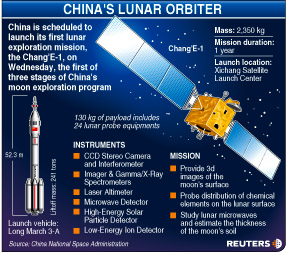
|
|
More than two thirds of the nation want to see the launch of Chang’e I, China’s first lunar orbiter live on TV, according to a survey.
|
More than two thirds of the nation want to see the launch of Chang’e I, China’s firstlunar orbiter live on TV, according to a survey.
According to the survey by China Youth Daily and www.qq.com, almost the entire nation wants to catch images of the event at some point, with 99 percent of the 10,358 respondents saying they expected to witness the satellite launch and 68.9 percent said they were certain to watch the live broadcast of the launch.
On www.qq.com and www.sina.com, two popular web portals in the country, internet users have contributed some 2,000 poems and 5000 drawings on the theme of Chang'e I.
"The satellite launch means much more than just saying 'hello' to the moon. Maybe in the future we could also send some people to accompany sister 'Chang'e'," said a college student in the survey.
Remarkably, many people expect to visit the moon one day, with 93.4 percent of respondents saying they expected to do so.
Chang'e I is named after Chang'e, a famous character from Chinese mythology. She ascended from earth to live on the moon as a celestial being after drinking an elixir.
The satellite will be launched between Wednesday and Friday, with 6 pm today being the best choice, a spokesman for the China National Space Administration (CNSA) said on Monday. Preparations are almost complete for the launch of the country's first lunar orbiter, according to a spokesman for the Xichang Satellite Launch Center.
點(diǎn)擊查看更多雙語(yǔ)新聞
(China Daily/Xinhua)
|
一項(xiàng)調(diào)查顯示,超過(guò)三分之二的中國(guó)人表示會(huì)收看我國(guó)首個(gè)月球探測(cè)器——“嫦娥一號(hào)”衛(wèi)星發(fā)射的電視直播實(shí)況���。
據(jù)該項(xiàng)由中國(guó)青年報(bào)和騰訊網(wǎng)聯(lián)合開(kāi)展的調(diào)查����,幾乎所有的中國(guó)人都想觀看“嫦娥一號(hào)”的發(fā)射盛況。在10358名受訪者中�,99%的人稱(chēng)希望親眼見(jiàn)證“嫦娥奔月”,68.9%的人說(shuō)他們一定會(huì)收看電視直播��。
截至目前�����,騰訊網(wǎng)和新浪網(wǎng)兩大門(mén)戶網(wǎng)站共收集網(wǎng)友創(chuàng)作的有關(guān)“嫦娥一號(hào)”的詩(shī)作約2000篇�����,畫(huà)作約5000幅�。
一名大學(xué)生說(shuō):“這次探月行動(dòng)不僅僅是到月球串個(gè)門(mén),和嫦娥姐姐打個(gè)招呼這么簡(jiǎn)單����。說(shuō)不定以后還能派幾個(gè)人給嫦娥姐姐時(shí)不常地做個(gè)伴���。”
調(diào)查發(fā)現(xiàn)��,很多人(93.4%的受訪者)希望有朝一日能到月球上看看�����。
“嫦娥一號(hào)”衛(wèi)星得名于中國(guó)神話傳說(shuō)中家喻戶曉的人物“嫦娥”�。她吃下長(zhǎng)生不老藥后化作仙女,從地球升到了月球上�����。
國(guó)家航天局的一位發(fā)言人于本周一公布����,“嫦娥一號(hào)”將于本周三至周五擇機(jī)發(fā)射,今天下午六時(shí)是最佳發(fā)射時(shí)機(jī)�。西昌衛(wèi)星發(fā)射中心的一位發(fā)言人稱(chēng),發(fā)射前的所有準(zhǔn)備工作已基本完成���。
(英語(yǔ)點(diǎn)津姍姍編輯)
|